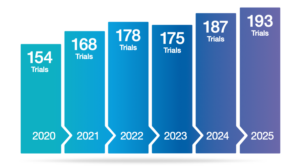
UK pharma lobby warns of crisis in British life sciences
The Association of the British Pharmaceutical Industry (ABPI) has warned that the UK could miss its target of becoming the number one in European life sciences by 2030.
The ABPI bases its assessment on the recently published Competitiveness Framework, a benchmarking tool based on 48 indicators. According to its figures, the UK has fallen significantly behind its global competitors in terms of R&D investment, number of clinical trials and foreign investment.
Based on the Competitiveness Framework, ABPI claims that R&D investment in pharmaceuticals has been declining since 2018, with growth falling to 1.9% per annum after 2020 and by as much as £100 million in 2023. In comparison, 12 comparable countries are said to have shown an average annual growth rate of 6.6%.
However, other sources such as the Office for National Statistics have come up with completely different figures. According to these, investment rose from £4.4bn to £5bn between 2018 and 2020 and fell by £300m between 2022 and 2023. The figures for 2024 have not yet been published, but the trend appears to be continuing downward.
Furthermore, according to data from the Competitiveness Framework, the UK also fell in the ranking for the number of clinical trials and foreign direct investment. It is said to have fallen from third to eighth place in terms of clinical trials.
However, an evaluation of the clinical trials listed on clinicaltrials.gov up to and including 2023 by the German pharmaceutical association VFA paints a different picture. According to this, the UK was the global number three in terms of the number of clinical trials before 2019, but in 2023 it was still behind Germany in sixth place.
In addition, according to ABPI data, the average preparation time for clinical trials in the United Kingdom is 273 days, which is faster than in China but lags behind the USA, Spain, France and Germany. This data distorts the view of the actual global situation documented in other sources: according to these, China had already reduced the average review time from 6-12 months to 60 days since 2018. In 2023, 56.3% of drug trials in China began recruiting patients within six months; the average start time was around three months – twice as fast as in the USA. In addition, the cost of conducting a clinical trial in China was 50% lower than in Western countries. Not least because of this, China clearly surpassed the USA in 2024 to take the top spot globally, with around 7,000 trials conducted, according to Chinese state sources.
Furthermore, ABPI criticises the work of the reimbursement authority NICE: only 37% of newly approved drugs are fully available in the United Kingdom, compared to 90% in the German market. However, it fails to mention that 90% of the drugs prescribed in the leading biopharmaceutical market are already generics.
In addition to its competition indicators, ABPI claims to have identified a divestment trend among its member companies and cites the withdrawal of AstraZeneca and Merck, which was partly due to US import tariffs, but deliberately omitted Eli Lilly’s investments from 2024.
The lobby association’s conclusion: the UK is in danger of losing its competitive advantage in the biopharmaceutical sector. Without urgent reforms, the government’s vision of becoming a global leader in the life sciences could become a distant prospect. At least the ABPI’s data on VC investment in the British biotech sector is correct: the UK has been by far the number one in Europe since 2017.




 EC- press service
EC- press service